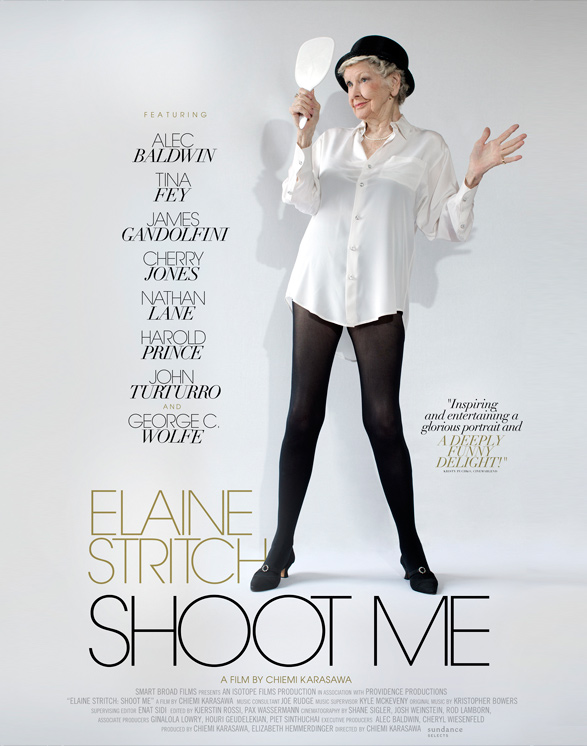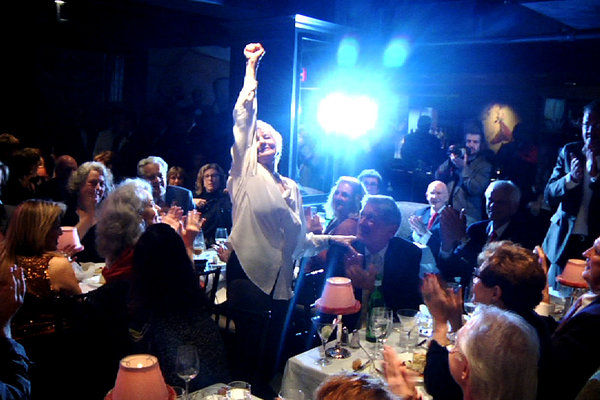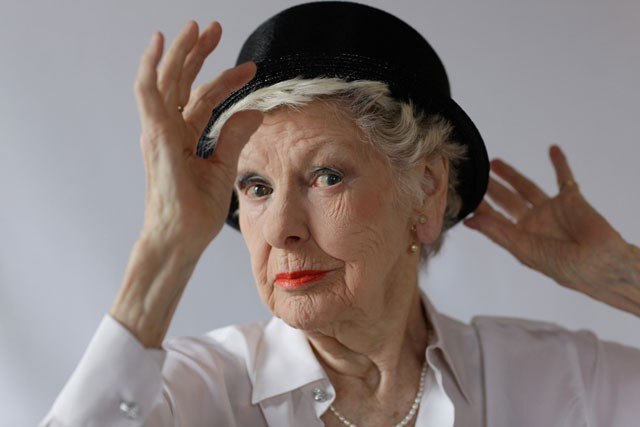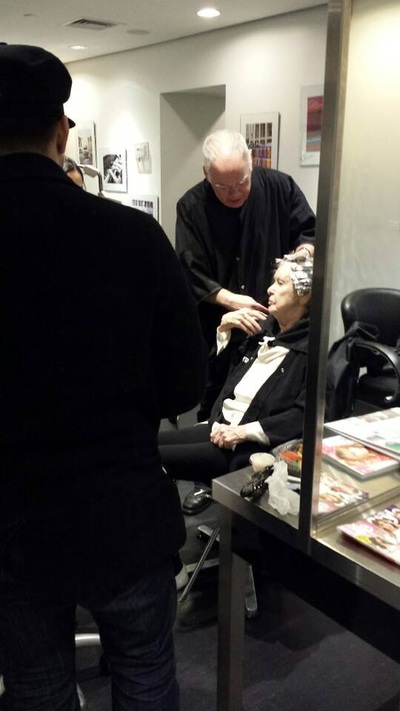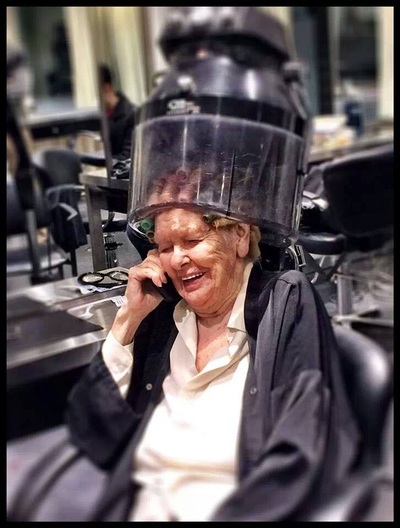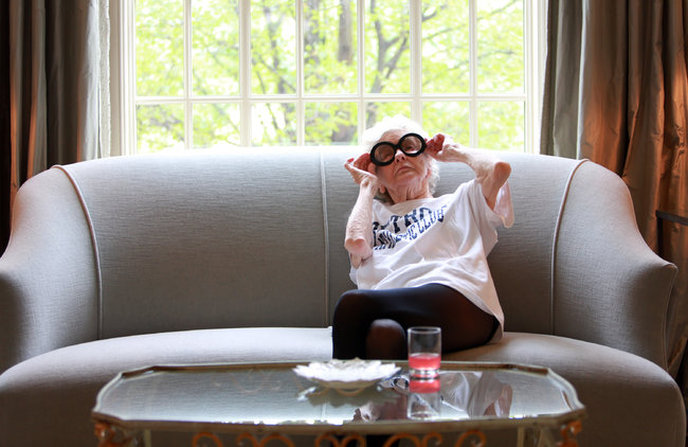|
The Consummate Performer, With Love Songs to the Audience
A Critic’s Appraisal: Elaine Stritch By CHARLES ISHERWOOD, NEW YORK TIMES (JULY 17, 2014) It’s common to describe a talent as singular, one of a kind or larger than life. And yet those words seem strictly accurate, albeit a bit flimsy, when applied to Elaine Stritch. Onstage and off, Ms. Stritch was strikingly blunt about needing to be loved by an audience, although in her later cabaret performances, her first words might be how terrified she was to be up there. Perhaps more than any other performer, she embodied the contradictions that churn in the hearts of so many actors and singers: Her constitution seemed to be equal parts self-assurance and self-doubt, arrogance and vulnerability. A need to be admired did constant combat with a nagging fear of being rejected. But unlike most performers, Ms. Stritch never felt the necessity (or had the filter) to mask either the egotism or the fragility, in public or in private. She made the complications of her own personality part of her art, indeed the wellsprings of it. And in acknowledging the depth of her needs, she touched a universal chord. For evidence of her singularity, consider that the greatest role she ever played was the demanding one of Elaine Stritch, in the blazing one-woman show “Elaine Stritch: At Liberty,” in which she related, in sardonic song and salty story, the turbulent arc of her life and career on Broadway and in the West End of London: the boozy all-nighters with Judy Garland, the emotional tussle with a young Marlon Brando, the privilege of having no less than Noël Coward write a musical for her. Nakedly honest, and practically naked — she wore just black tights and a man’s shirt, referring to herself at one point as “an existential problem in tights” — Ms. Stritch gave a performance that set an unmatched standard for solo shows about the unlikely breaks, tough knocks and heady but dangerous highs of life in showbiz. While looking her age, she somehow still seemed ageless, as well as tireless and fearless. In a performance that brought audiences to their feet not just out of dutiful affection but from electrified excitement, Ms. Stritch showed off her deep scars as casually as she recalled the high points of her career. She sang Stephen Sondheim’s “The Ladies Who Lunch,” from the musical “Company,” with the same dust-dry acerbity, and raging emotional force, that she brought to it three decades before. With the same inimitable phrasing she used to draw out the comic bite in a lyric, Ms. Stritch delved into anecdotes about the darkest aspects of her life, including her long battle with alcoholism. This defining performance came when Ms. Stritch was well into her 70s, at an age when many actors retire, or settle for small parts, or fade into obsolescence. There would be none of that for Ms. Stritch, who found herself a whole new audience a few years later, when she portrayed the ego-chomping mother of Alec Baldwin’s character in “30 Rock.” Only at the very last, when her memory began to fade, and she seemed to lose some of her savor for performing, did Ms. Stritch move back to Michigan, where she grew up. And then, of course, she made a two-act drama of her retirement, saying in an interview last summer that a) she wasn’t sure it was a good idea, and b) she wasn’t really retired, just sort of resting after her busy life in New York. Until the end, she continued to captivate, to amuse, to fascinate, occasionally to frustrate. In her last Café Carlyle performances, she sang just a handful of songs and mostly talked, with no real focus, about whatever she wanted to talk about; no one seemed to mind. What united her classic performances, in character or as herself, was a commitment to digging into the truth in the texts she was given. She would use that craggy rasp of a voice to underscore the almost stoic resignation in a song like Mr. Sondheim’s “Send in the Clowns,” or turn his “Every Day a Little Death,” also from “A Little Night Music,” into a grimly honest little prose poem shorn entirely of the rippling musical accompaniment that somewhat softens its sting. One of the most arresting, and unlikely, moments in “Elaine Stritch: At Liberty” came when she performed the song “Something Good,” originally a love duet from the movie of “The Sound of Music” — a seemingly sugary tune one would not naturally associate with her hard-bitten, wised-up persona. She recast it as a yearning love song performed to the audience, whose admiration she needed, and appreciated, but probably never ceased to question. The lyrics are faintly imploring: Nothing comes from nothing Nothing ever could So somewhere in my youth or childhood I must have done something good. Ms. Stritch sang the words with a quiet gravity that was strangely affecting. Even having returned to Broadway at 76, more triumphant than ever, she still seemed to wonder if she was worthy of our admiration. She was. An appraisal on Friday about the career of the Broadway actress Elaine Stritch quoted incorrectly from the song “Something Good,” which she sang in her show “Elaine Stritch: At Liberty.” It goes, “Nothing comes from nothing” — not “Nothing ever comes from nothing.” (full story)
Despite being 88, stage, movie and television legend Elaine Stritch managed to wow everyone at the Tribeca Film Festival while attending the premiere of the documentary about her life, Elaine Stritch: Shoot Me.
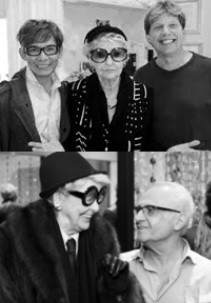
Vartali’s Behind-the-Scenes Role
In New Documentary Film: “Elaine Stritch: Just Shoot Me” (by Fern Flamberg) The critics are buzzing about the new documentary film, “Elaine Stritch: Just Shoot Me,” featuring the Broadway legend’s farewell performance at the Carlyle Hotel. But not everyone knows that the idea for the movie originated at the Vartali Salon. It was the brainchild of stylist Piet Sinthuchai, who introduced the Grand Old Broad of Broadway to first-time filmmaker Chiemi Karasawa when their appointments just happened to overlap. Piet observed the immediate connection between the two women and suggested they make a movie together. Not leaving anything to chance, the soft-spoken stylist arranged for his clients’ subsequent appointments to coincide – not a very difficult feat, he confides, since Elaine came to the salon several times a week when she lived in New York. “Elaine is very particular about the way her hair looks,” Piet says. “She has her own signature style, which we achieve with a roller set and classic comb-out.” While the feisty singer is well into her 80’s, she likes her hair to have a modern touch, so Piet pulls little pieces out from the jaunty hat she always wears. “They soften her face and play nicely against her over-sized glasses.” Elaine is also a long-time client of hair colorist Michael Stinchcomb, who says, “She’s an icon – a conduit to the golden age of Broadway. She’s also a wonderful person and a true professional. She’s very smart and knows exactly what she wants. And that all boils down to feeling secure about the result we achieve each time we do her color. The challenge, Michael explains, is that Elaine is often under spotlights which can drain color from the hair and make it look drab or gray. To compensate, I have add contrast to her base by layering in warm tones.” Many of Vartali’s regular clients have caught a glimpse of Elaine striding about the salon in her skinny tights and long white shirt. Vartan says, “Elaine is like a family member at Vartali. She has been a faithful client for nearly a decade She knows she can trust us to be the guardian of her look and she never demands star treatment. Chiemi Karasawa has been a regular client for many years, too. We are delighted by the media attention she has received with her film about Elaine. We are honored we could act as matchmakers and play a role in their joint success.”
"Elaine Stritch: Shoot Me" is a ferocious, funny and poignant portrait of the one-of-a-kind Broadway legend as she reaches her 87th year.At 87, Broadway legend ELAINE STRITCH remains indisputably in the spotlight. In the revealing and poignant ELAINE STRITCH: SHOOT ME, the uncompromising Tony and Emmy Award-winner is showcased both on and off stage via rare archival footage and intimate cinema vérité. By turns bold, hilarious and moving, the film’s journey connects Stritch’s present to her past, and an inspiring portrait of a one-of-a-kind survivor emerges.
In stolen moments from her corner room at New York’s Carlyle Hotel and on breaks from her tour and work, candid reflections about her life are punctuated with photographs from her personal collection and words from friends (including Hal Prince, George C. Wolfe, Nathan Lane, Cherry Jones, Tina Fey, James Gandolfini and John Turturro). Whether dominating the stage, tormenting Alec Baldwin on the set of “30 Rock,” or sharing her personal takes on her struggles with aging, diabetes and alcoholism, ELAINE STRITCH: SHOOT ME reaches beyond the icon’s brassy exterior and reveals a multi-dimensional portrait of a complex woman and artist. ELAINE STRITCH: SHOOT ME marks the directorial debut of acclaimed documentary producer Chiemi Karasawa.
Movie Review: 'Elaine Stritch: Shoot Me' • The Times critic Stephen Holden reviews "Elaine Stritch: Shoot Me."
Recalling Velvet, Pretzels and Beer, She’s Still Here‘Elaine Stritch: Shoot Me’ Goes Backstage With a Legend “A Molotov cocktail of madness, sanity and genius.” That is one description of the great Broadway and cabaret entertainer Elaine Stritch in Chiemi Karasawa’s acutely intimate documentary portrait, “Elaine Stritch: Shoot Me.” It was filmed as Ms. Stritch was preparing her cabaret show “Elaine Stritch Singin’ Sondheim ... One Song at a Time,” while coping with diabetes and worsening memory loss. Her fierce lust for life mirrors Dylan Thomas’s dictum “Old age should burn and rave at close of day.” Ms. Stritch, now 89, is one of the ultimate examples of a classic Hollywood type: the brassy, hard-boiled dame who is never at a loss for a wisecrack. The disparity between the blazing stage performer with the glare of a lion on the prowl and the frail, fearful old woman seen in the hospital after a medical crisis could hardly be greater. The movie invites you to reflect on questions that Ms. Stritch asks herself frequently: Who am I when I am off the stage? Without an audience, do I even exist? read full story
photo: Elaine Stritch, photographed at the Carlyle hotel in New York City.
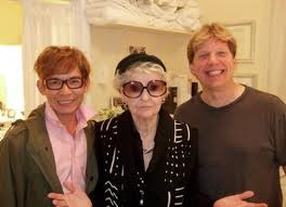 Piet (L), Elaine Strich, Rob Bowman Piet (L), Elaine Strich, Rob Bowman
There are times one should take serendipity seriously. “I was having my hair cut at Vartali on 57th Street and I spotted a woman crossing to the color station. ‘Is that Elaine Stritch?’” director Chiemi Karasawa asked Piet Sinthuchai, her hairdresser. “Yes,” he said, and after a few moments added, “You should be making a documentary about her.” And so it came about that Elaine Stritch: Shoot Me has become Karasawa’s directorial debut. The documentary offers an inspiring, deeply candid portrait of the then-87-year-old, brassy Broadway legend (who just turned 89), known for her roles in Edward Albee’s A Delicate Balance, Stephen Sondheim’sCompany, and as Alec Baldwin’s mother on 30 Rock. Quintessentially herself, Stritch is caustic, charming, and willing to expose all—her fragile health, struggles with alcoholism and diabetes, and the constant anxiety of feeling her own mortality. “I think the process of ‘documenting’ one’s life somehow validates it,” says Karasawa, who tapped Tina Fey, Hal Prince, and Nathan Lane to make cameo appearances—testimonials to this beloved leading lady. “The one thing being around Elaine provides, other than endless amounts of entertainment, is she instills courage. In other words: balls,” Karasawa says. “After speaking to many incredible actors and performers, the common denominator is she makes others rise to the occasion because of her incredible passion and dedication.” Karasawa goes on to note how Stritch loved to use the F word—and when asked how she would describe her subject, she said, “A broad, in the best sense of the word. She’s funny, fabulous, fearless, fragile . . . forgetful? She is also fierce!” The most surprising thing she learned about Stritch: how vulnerable she is. How, behind the formidable exterior—the brass, the smoke and mirrors—is someone who questions everything. And how very tender and sweet she can be. “It’s wonderful being almost 87,” Stritch says in the documentary, her delivery deadpan. “You can get away with just about anything.” (By A. M. Homes, Photograph by Brigitte Lacombe, vanityfair.com)
1 Comment
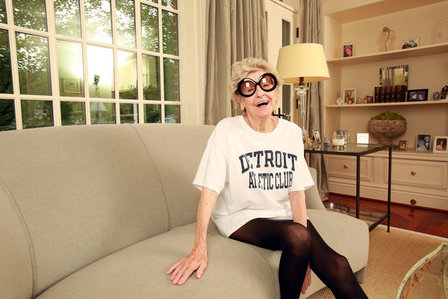 As Fierce as She Is Fragile: Elaine Stritch in Michigan By CHARLES ISHERWOOD (nytimes.com) BIRMINGHAM, Mich. — Even at 88, and in what might be called spectacularly frail health, Elaine Stritch can still make a theatrical entrance. Dinner is ready, in the condominium just next door to the one Ms. Stritch herself moved into last spring in this pristine Detroit suburb, near where she grew up and where much of her family resides. The crab cakes have been baked, the corn on the cob boiled, the spinach steamed, the cocktails stirred. Still, no sign of Ms. Stritch. 0 The minutes tick by, with a small frisson of anxiety building. The dinner’s hosts, Kim and Henry Hagood, who have become Ms. Stritch’s friends since she moved next door, can’t seem to get a response, either to a phone call or a knock on the door. We all know she’s not been well lately. Then, with little fanfare, there she is, a beaming smile on her face, a barking command to her caretaker on her lips. She is dressed with her usual, ahem, minimalism, in black tights, a Detroit Athletic Club T-shirt and not much else. Except for one new and unhappy accessory: a wheelchair. Ms. Stritch would doubtless prefer a modest string of pearls, but the last several months have not been kind. Before making her dramatic exit from New York — to theater lovers for whom Ms. Stritch is an ornery goddess, it was as if the Chrysler Building itself had picked up its skirts and skipped off to Detroit, of all preposterous places — Ms. Stritch took a bad fall one morning while leaving her longtime habitat, the Carlyle Hotel. Eye surgeries followed. Not long after that, Ms. Stritch took a second tumble, breaking a hip. Recovery was under way, and Ms. Stritch was settling down in Birmingham when she leaned over to brush her teeth one night at the bathroom sink, somehow lost her balance, and hit the deck again, fracturing her pelvis. So for at least another month or six weeks, she won’t be up and about, although for someone used to striding about with a commanding gait in those tights and heels, she seems to be taking her tumble into infirmity with some measure of acceptance. When asked what she’s been doing to keep herself occupied, the answer comes quickly: sleeping, often until 3 or 4 in the afternoon — late, even by the standards of showbiz folk. But she seems to relish this: “I’ve been preparing for this nap for a long time,” she says. Black humor has always come naturally to Ms. Stritch, whose long career, on the New York and London stage, and, more recently, on the television series “30 Rock,” has made her a well-armored survivor. Asked how she has been adjusting to her new life away from the spotlight, Ms. Stritch says, “I don’t really know, I’ve been too busy falling down. “It’s like a comedy,” she adds, “only a not so funny one.” Shortly after arriving in Birmingham, Ms. Stritch gave an interview to the Vanity Fair Web site, in which she seemed grousy and regretful. Grousing has always come naturally to this scaldingly frank woman, but she’s never made much of a song and dance about woulda, coulda, shoulda. “I’m thinking maybe I left a little early,” grumbled the woman once notorious for being the last to abandon any party. The gods apparently can’t take a joke, because for now, at least, even strolling next door is out of the picture for Ms. Stritch. And yet, perhaps because she’s been forced to settle down, her attitude toward her sudden bolt from the spotlight seems to be mellowing. “One thing I’m proud of myself for doing is combating those feelings,” she says, when those professed second thoughts are mentioned. “I don’t want to be a sad sack who made a mistake. I gotta have a home, a base, a place where all my shoes are. I’m settled. When I first moved in here, I had good friends around me, but I kept thinking, ‘I can’t imagine being here alone.’ But then I was alone, and everything was fine. Now I’d kill to be alone,” she adds, referring to the full-time caretaking she now requires. “I’ve come up against tougher things than this,” she adds. “I want to win at this decision.” If that still doesn’t sound like a ringing affirmation of her happiness, so be it. Putting up a veneer of good cheer has never been Ms. Stritch’s stock in trade. Putting it all out there is much more her style, and in conversations over dinner and in her kitchen the following day, Ms. Stritch remains the same blunt, acerbic, unedited personality she always has been, even if the pain killers she takes sometimes find her beginning a story, only to lose its thread (“I guess I just won’t be giving you that jewel,” she says grimly), or asserting an opinion only to proffer another view a few minutes later. Ms. Stritch dismisses with a violent wave of the hand the idea that she will wither away outside the media glare. “That takes me no time at all,” she says. “I’m not tied to all that. That’s not what I got into the theater for and it’s not what I got out of the theater because of.” But she also readily acknowledges that the adoration of an audience has been a sustaining force in her life, often when there wasn’t much else. And she would still be happy to return to work. “I would go to New York and do a play at the drop of a hat,” she says. The stage is where she has always felt most at home, and she seems both intrigued and intimidated by the idea of appearing in a potential revival of Edward Albee’s “Three Tall Women,” which Mr. Albee himself has suggested. (Ms. Stritch is particularly proud of her performance in the 1996 revival of Mr. Albee’s “Delicate Balance.”) The play is among Mr. Albee’s darkest, a troubling meditation on the rough waters of life at any and all stages, and the darkness that looms at the end. But in at least one respect, Ms. Stritch seems ready to embrace its themes: she talks about her own mortality with a frankness that almost seems like relish. What seems to irk her most about life — at least at present — is its gosh-darned expensiveness. The latest affront is a property tax bill she’s just been slapped with. Life in Birmingham hasn’t turned out to be the economic break she’d expected. “It’s more expensive than I ever dreamed,” she says. “I’d better die at my appointed time.” During the afternoon interview, Ms. Stritch’s niece Sally Hanley was on hand in the kitchen, having stopped by for a visit. Ms. Stritch’s move to Birmingham was motivated by fatigue with the heady bustle of New York (“I’m tired of the energy”) and a desire to settle down where she had family close at hand. She says she’s enjoyed seeing more of them, although even here the greeting-card sentiment goes quickly through a paper shredder. “I don’t want to see my family all the time,” she adds, “and they’re delighted, I’m sure, to be aware of that.” Ms. Hanley adds genially, “We just show up at the door.” Ms. Stritch also likes the idea of having family at hand to arrange matters after she’s gone. “If I drop dead here tomorrow morning, I call Sally, and they come and they take over,” she says, with charming illogic. She’s already made all the arrangements for her interment. (On the gravestone, she says, her epitaph will be a single word: “Later.”) “It’s kind of nice to have that all behind me,” she explains. “It costs a fortune, by the way.” If the accidents that have laid her low physically have inspired some grim meditating on mortality (and money), Ms. Stritch, at least, does it with her customary wry panache. And in at least one respect, she’s striking out in a new, or at least a long-abandoned, direction. Somewhat surprisingly, given her 25 years of sobriety, Ms. Stritch recently began drinking alcohol again, on a modest scale: at dinner she had a cosmopolitan — preprepared and brought over by her caretaker in a plastic water bottle — and took two sips of Champagne. And during the interview the next day, there was the cosmo again, looking oddly like Hawaiian Punch, in a glass on the table. She does not fear that one cosmo will lead her back down into alcoholism, partly because her diabetes requires such careful management, but also because she no longer feels so acutely the sting of insecurity that booze softened. “I was always trying to prove something about myself,” she muses, “and alcohol helped get me through that. But now I’m not escaping from anything. I’ve got a few questions answered.” Not all of them, of course. Ms. Stritch feels there is one aspect of life she has yet to master, and now finally has the time to attempt: simple satisfaction. When asked what her larger purpose was in removing herself from the city that adored her, sustained her, and then came to tire her, she grows reflective. “I’d like to discover life,” she says. “Quite frankly I don’t know how to be happy. I have not a clue. I only serve — and I don’t say that with any grandeur. I just serve others through entertaining. That’s when I am happy. I’m not just delighted with myself when I’m entertaining,” she adds sarcastically, “but I’m happier than when I’m not.” Elaine Stritch in her new place in Birmingham, Mich. “It’s like a comedy,” she said of her post-New York life in recent months, “only a not so funny one. (Photo: Fabrizio Costantini for The New York Times)
|
Vartali BlogNew York City events, news, fashion, celebrities, beauty tips, health & fitness, games, our latest promotion and more Categories
All
Archives
June 2015
LinksInfo |

